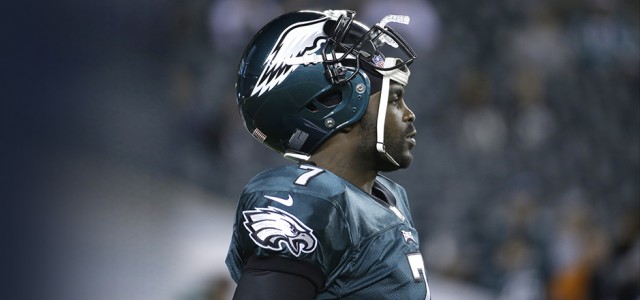MICHAEL VICK TOOK an improbable path from number one NFL draft pick to federal prison. His long road back took him through Philadelphia, and last week he landed with the New York Jets. There, the man who once lost everything to a dogfighting conviction can shine under the brightest lights, speak in the largest media market, and perform on the biggest stage.
That’s as it should be, because it means that Michael Vick has finally received the justice he deserved. Not because a one-year, $5 million contract makes him an elite NFL quarterback. It doesn’t. Not because what happened with the dogs was right. It wasn’t. No, Michael Vick’s move to New York represents justice because he has finally triumphed over a punishment that never quite fit his crime.
“Michael Vick has finally received the justice he deserved. Not because a one-year, $5 million contract makes him an elite NFL quarterback. It doesn’t. Not because what happened with the dogs was right. It wasn’t. No, Michael Vick’s move to New York represents justice because he has finally triumphed over a punishment that never quite fit his crime.”
Vick not only served two years in federal prison. He was vilified by a public that protested more loudly against his dogfighting past than it did against child molesters and murderers. I wish there was a rational explanation for that, but I’ve lived long enough to know that our society often penalizes minorities more harshly than others, beginning with preschool children. Vick surely understood that reality. Yet, to his credit, he never said a word about it. Not publicly, at least.When his critics said he should never again be allowed to make $100 million to play football, as he’d done with the Atlanta Falcons, he didn’t respond as he could have, by pointing to white athletes who’d escaped punishment despite far worse misdeeds.
Comparisons to Michael Vick
Vick never spoke of Pittsburgh Steelers quarterback Ben Roethlisberger, who wasn’t criminally charged for the alleged March 2010 sexual assault of a 20-year-old college student, but instead received a six game NFL suspension that was shortened to four games. Roethlisberger also faced a second case, which was outlined in a March 2009 civil suit filed by a Harrah’s Lake Tahoe casino hostess who accused him of luring her to his room and raping her. The quarterback settled that case out of court in 2012.
Vick also never spoke of former Phillies pitcher Brett Myers, who beat his wife in public and rejoined the team within weeks. The case against Myers was later dismissed when his wife refused to press charges. Vick didn’t utter the name of Louisville basketball coach Rick Pitino, who had an extramarital affair, allegedly paid to terminate a resultant pregnancy, and received the full support of his employer, despite the fact that his behavior violated a morals clause in his contract.
Vick didn’t mention any of that. Rather, Vick stood up like a man, took responsibility for his own actions, and worked to redeem himself. Along the way, he became one of the NFL’s most active players involving charities, helped pay for a field for a North Philadelphia football team called the Aztecs, and became a husband and father whose example other men could follow.
But those things would have been next to impossible without someone standing up for the idea of forgiveness, and seeing the potential on the other side of Vick’s mistakes.
Forgiving Michael Vick
Former Eagles Coach Andy Reid was a man who understood the value of second chances. Having watched his two sons engage in drug addictions that resulted in jail time—and later cost one of them his life—Reid understood that none of us is infallible, and that there are times when second chances are needed. Reid played a vital role in convincing Eagles owner Jeffrey Lurie to roll the dice on Vick. That’s why I praised him in the Philadelphia Daily News in August 2009, after Vick signed with the Eagles.
“I applaud Reid for demonstrating forgiveness,” I wrote at the time. “I commend him for facing a media more concerned with stoking the flames than dousing the fire. Most importantly, I admire Reid for presenting a portrait of manhood to which all of us should aspire.
“Standing up for right isn’t always popular. Embracing someone who’s fallen isn’t always easy. But sometimes, as a man, you must stand on the strength of your convictions, and ignore the cries of the crowd.”
As far as I’m concerned, that is the silver lining to the darkest clouds of Vick’s journey. Men like Reid, Lurie and Tony Dungy, who acted as a spiritual advisor for Vick, were willing to see Vick’s misdeeds for what they were. They were willing to give Vick the same second chance that was given to Ben Roethlisberger, to Rick Pitino, to Brett Myers, and to countless others.
They were willing to see Vick as more than a stereotype, and to give Vick the opportunity to redeem himself not just in the eyes of the world, but also in the eyes of his wife and children.
Michael Vick took that chance and ran with it. In doing so he showed us what redemption looks like, and all of us are better for having seen it.![]()
FEATURED PHOTO: Philadelphia Eagles’ Michael Vick warms up before the first half of an NFL football game between the Philadelphia Eagles and the Chicago Bears, Sunday, Dec. 22, 2013, in Philadelphia. (AP Photo/Matt Rourke)
 Solomon Jones is an Essence bestselling author, award-winning columnist, and creator and editor of Solomonjones.com. Click here to learn more about Solomon.
Solomon Jones is an Essence bestselling author, award-winning columnist, and creator and editor of Solomonjones.com. Click here to learn more about Solomon.








